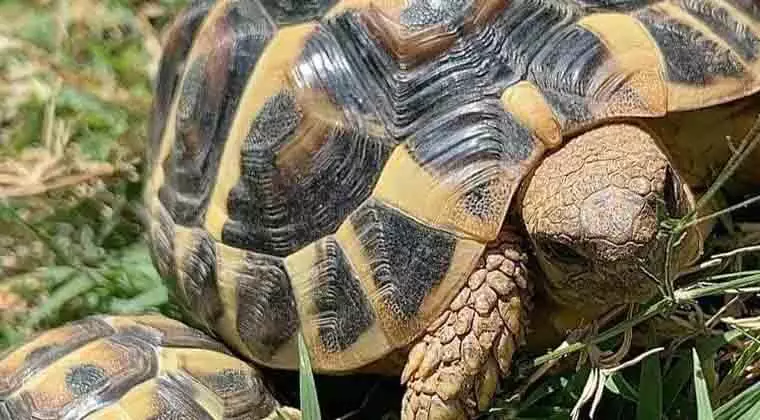Yes, Sulcata tortoises can eat blueberries. Blueberries are a great source of vitamin C, calcium, and fiber for tortoises. They should be fed in moderation as part of an overall healthy diet. When feeding your tortoise blueberries, it is important to wash them first to remove any dirt or pesticides that may have been used during growth.
Additionally, make sure the berries are cut into small pieces so they do not choke on larger ones. As with all foods given to tortoises, freshness is key; avoid giving them old or moldy fruits and vegetables as this could cause digestive issues or even death in some cases. All in all, blueberries make a great treat for Sulcata tortoises when given under proper supervision!
What Can Sulcata Tortoises Eat List?
Sulcata tortoises are herbivorous animals, meaning their diet is mostly composed of vegetation. They can eat a variety of edible plants and grasses including dandelion greens, collard greens, kale, clover, hibiscus leaves, endive, and escarole. In addition to fresh produce, they also enjoy occasional treats such as melon or sweet potatoes.
It’s important that you stay away from feeding them foods with high sugar content such as fruits or processed foods like dog food since this could be harmful to their health.
Can Hermann Tortoise Eat Blueberries?
Yes, Hermann Tortoises can eat blueberries as part of their diet. Blueberries are a good source of vitamin C and other important nutrients for tortoises, so they make an excellent snack or treat. However, these treats should be given in moderation as part of a balanced diet to avoid overfeeding your pet.
Can Tortoises Eat Blueberries?
Yes, Tortoises can eat blueberries! Blueberries are an excellent source of nutrition for your tortoise. They provide essential vitamins such as vitamins A, C, and E that promote good health. In addition, blueberries contain antioxidants that help protect the body from free radicals that cause damage to cells.
The high water content in blueberries also helps keep your tortoise hydrated for optimum digestion and performance. When feeding your Tortoises with blueberries make sure that you only give them one or two at a time as they will be quite sweet and can upset their stomach if too many are consumed in one sitting. Be sure to cut up any large pieces into small ones so they can easily consume them without choking on them.
What Sulcata Tortoises Should Not Eat?
Sulcata tortoises are a type of desert-dwelling turtle native to the Sahara Desert. While these animals can be great pets for people who have the space and resources to care for them properly, their diet is incredibly important. It’s essential to understand what Sulcata tortoises should not eat in order to avoid health issues that could lead to serious medical problems or even death.
Unfortunately, many pet owners are unaware of this fact and feed their turtles unhealthy foods that can cause weight gain, obesity, and other health issues. Sulcata tortoises should not eat any dairy products such as cheese or milk; high-carbohydrate vegetables like potatoes; fruits with high sugar content such as watermelons; nuts or seeds; processed meats like hot dogs or sausages; chocolate; caffeine drinks like coffee and tea, alcohol beverages or anything else containing artificial ingredients.
Instead, they should stick to items from their natural diet which includes grasses (such as Bermuda grass), weeds (like dandelions), dark leafy greens (like collard greens) along with some low-sugar fruits such as apples and berries.
What Fruits Can Tortoises Not Eat?
Tortoises are herbivores and thrive on a diet of leafy greens, vegetables, and some fruits. While there is no one-size-fits-all diet for tortoises, there are certain fruits they should avoid. Some of the most common fruits tortoises can’t eat include apples, oranges, grapes, strawberries, blueberries, and bananas.
These types of fruit contain high levels of sugar and acidity which may cause digestive issues in tortoises if consumed regularly or in large quantities. Additionally, citrus fruits such as lemons and limes can be toxic to tortoises due to their acidic nature so these should also be avoided.
Instead, you can offer your pet alternative treats like watermelon slices or papaya that have lower sugar content but still provide them with essential vitamins and minerals needed for proper health maintenance. Ultimately it’s important to remember that variety is key when feeding your pet any type of food – too much of anything could lead to health problems down the line!
What is a Sulcata Tortoise Favorite Food?
Sulcata tortoises are one of the most beloved pet reptiles in the world. These gentle giants are not only visually stunning animals but they also have an incredibly long lifespan and can be a great addition to any home. As with all pets, it’s important to maintain their diet and make sure that you’re providing them with all of the nutrients they need to stay healthy.
A Sulcata tortoise’s favorite food is grasses, weeds, and leafy greens like dandelions or clover; however, they can also benefit from eating other vegetables such as squash and carrots or even some fruits like apples or bananas.
To provide your Sulcata with the balanced nutrition it needs for optimal health, you should supplement its diet with commercial pellets specifically designed for herbivorous turtles and tortoises. Additionally, these animals need a source of calcium to help keep their shells strong so offer them cuttlebone which is available at most pet stores.
Sulcata Tortoise Feast UNLIMITED Blueberries for BIRTHDAY!
Conclusion
Blueberries can be a healthy snack for Sulcata tortoises but it should not make up the bulk of their diet. Blueberries are high in sugar and could cause health problems if eaten too often. Therefore, it is important to provide your Sulcata tortoise with a balanced diet that includes fruits, vegetables, and other sources of nutrition. Treats like blueberries should only be given occasionally as an occasional treat.
